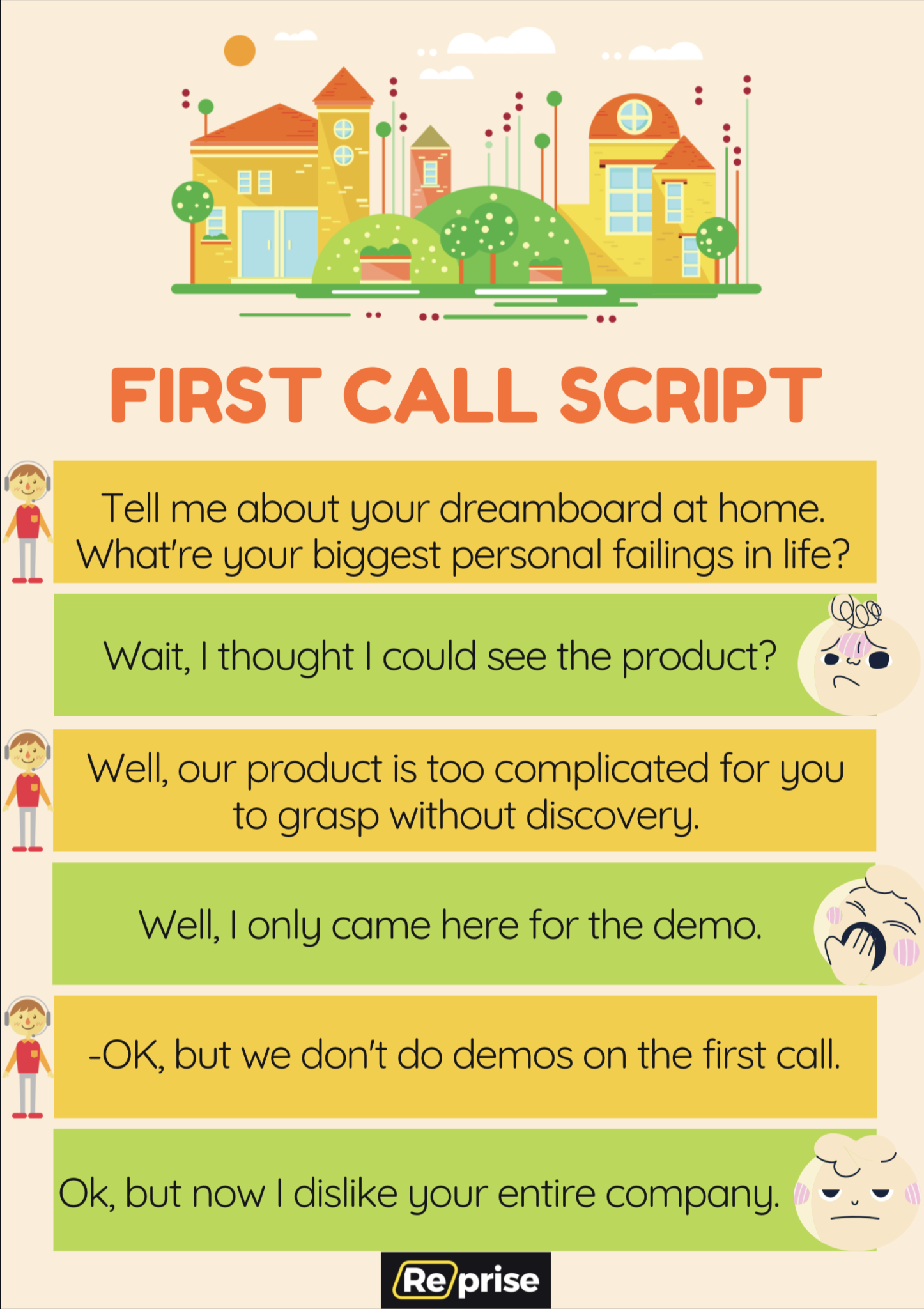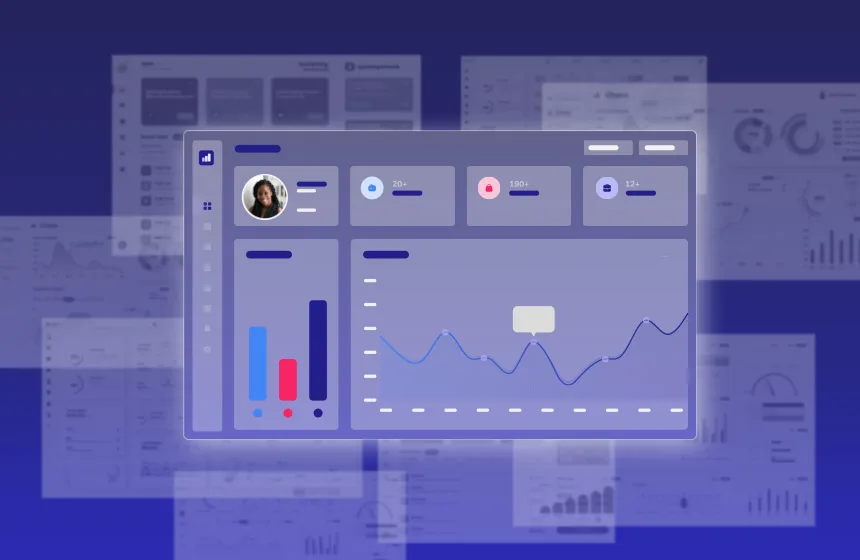Live Sales Demo Training: How to Handle the First Call

April 23, 2025
Table of Contents
Personal experiences with this
I’ve been in sales for twenty years; across five orgs, three industries, under six different sales vp/cro types. I’ve been trained on five methodologies. I flew in a seven seater puddlejumper to spend a week in Marshall, Minnesota at a sales training boot camp put on by USBancorp. Another week in Louisville for a Sandler all-in. I’ve had John Barrows, Winning By Design, Force Management, and Sandler all in my building. (and I signed the invoices.) Nevermind the one day seminars, the speaking sessions at field events, and the deluge of selfie-thought leadership I get hit with on linkedin.
I have been trained in sales. I have gotten sales training. A lot.
One constant, universally agreed upon principle in sales, across all variables, is that you don’t demo on the first call. (just ask anyone.)
“Discovery, and then demo.”
“Don’t show up and throw up.”
“Don’t spill your candy in the lobby.”
Regardless of where you got your sales training, you’ve probably had it drilled home that you should not be doing a demo on the first call.
So, why do your prospects keep freaking asking?
Why buyers want a product demo
They’re calling it the B2C Consumerization of B2B buying. It means that the shopping we’re doing in our personal lives is starting to bleed into our professional approach. I like window shopping on Amazon. I book my Airbnb without talking to a hotel clerk. I order uber without talking to the taxi dispatch. I use yelp and I filter for star rating. And it’s all there for me, without you- the seller. I’m getting used to not needing you. In fact, I’m really liking it.
So, it’s only natural that I want it that way at work too. And a lot of vendors are playing ball. In fact, it’s really just the next natural phase of progress for our industry. Moving from on prem to the cloud, from upfront fees to monthly costs, and from a field model to inside sales was just the beginning for us. The disruption will continue, and it will bleed into not just what we sell, but how we sell. So it’s natural to occur and it’s here to stay.
‘Let me see what you got and I’ll decide if I want to know more.’
Why sellers want discovery
The holdup to this trend is the sales team and their desire to do discovery. We equate the situation to your annual physical- “How would you feel if your doctor just started rattling off a prognosis and treatment plan before even asking a single question?”
We probably have a handful of value props or use cases, and we’re afraid to ‘miss the mark’ if we pitch without a little intel.
We know that this demo might be the last thing you “need” from us, and once you get it you might never return our call again.
We might be worried about our scalability or cost of sale, and we use the first call to qualify you before assigning additional internal resources (like an AE or SE.)
But most of all, it seems, is that we’ve been trained hard that we do not do demos without discovery.
It’s a talk track. It’s a sales process. It’s an internal rule. “It’s just how we work here.”
How this typically plays out
Ever have an awkward start to a call? Where the prospect and seller both seem incredulous to find themselves in this situation?

This is a fistfight! And it’s what you’ve designed. You set your marketing budget and you design your sales process. You spend a fortune on high-end content so your customers can educate themselves. You beg customers for G2 reviews so prospects don’t have to hear it from you.
You sneaky plant your value props and demo videos into banner ads on every platform we use as you follow us around and assault us with your messages just begging us to come show up and see a demo. You put FREE DEMOS!! And REQUEST A DEMO! in bright flashing lights all over your website.
You offer the demo..and then you train your sales rep to not give the sales demo. Like it’s some gut check, some point of pride. You make it combative because someone wants to learn more about what you do? Bananas. That’s a big ol’ bait and switch!
Advice
We hosted a series of small group discussions to talk about this problem. We ‘polled the experts’ and here’s the cream:
- It depends. We’re not waffling, but it actually does depend. If your sale is overly technical, if the industry expects a discovery conversation, (etc, etc) then you should go with the norms. You should not jump into a demo that nobody asked for or would understand. But just check yourself- if you’re having problems early on in your discovery calls then it’s on you to resolve that. You’re the vendor. Figure it out.
- Resolve the tension. The best advice we heard was to just resolve the tension. Some teams are doing what they’re calling a hybrid disco/demo call. Some teams have adopted slideware or parts of their website as the ‘give’ in a give-and-take call. Others are doing a “harbor tour” or business value/abridged demo while reserving the deep dive demo for later calls. The smartest companies are offering benchmark studies or free diagnostics as the hook instead of a demo. Whatever- It’s about sharing and volunteering as much information as you request. It doesn’t actually have to be a full on demo. You just can’t leave them embarrassed by asking and being shot down.
- Train and architect tailoring. The lead source or entry to your funnel is king. Inbound should expect to be asked why they came inbound. Outbound was probably promised some compelling offer of how you’ll help them. Following that logic all the way down your list of lead sources and make sure you’re handling each meeting type appropriately. It’s paramount that you train your sales team on the psychology of this. Run drills like flash cards; one side has the lead source, the flip side has the proper disco call intro. Build it into your crm and tech stack> make it part of the required info for a BDR to get credit on a meeting and part of the AE’s account map. Train on it, inspect in, enforce it.
Buyers are starting to expect to be treated like human people. They’re not ingredients for you to jam through your sausage grinder. They’re not a means to an end.





